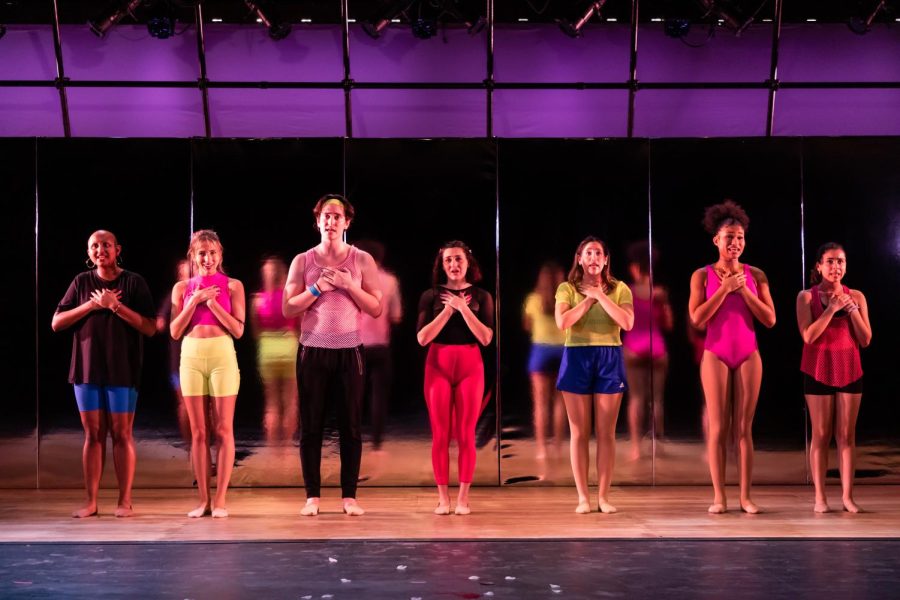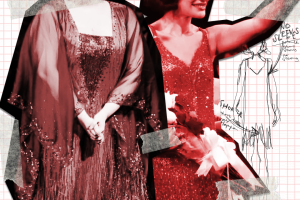‘Dance Nation’ Completes a Sold-Out Run on the Fordham Mainstage
On girlhood, growing up and looking back, all while dancing for your life for the chance to make it to ‘TAMPAA BAYYY’
JAMES BARTHOLOMEW
“Dance Nation” tells the story of a preteen dance competition team plotting to overtake the world.
October 27, 2022
For its first mainstage show this semester, Fordham Theatre presented “Dance Nation,” performing six shows over two weeks, all of which have been sold out or just short of it. “Dance Nation,” which opened on Oct. 6, is a revolution, a force of nature tackling adolescence, identity, queerness, masturbation, discovery and coming to terms with the wrestling of ambition and potential — all at the ripe age of 13.
The play, written by Clare Barron, tells the story of a preteen dance competition team plotting to overtake the world. A cultish atmosphere was set from the beginning, with the young girls (and singular ballet guy) responding to their dance teacher like cadets to a sergeant. There was also the establishment of a deep drive to win as a team and individually — pitted against one another while also expected to hold each other up.
The play features a cast of seven dancers: Amina, Zuzu, Ashley, Sophia, Maeve, Luke and Connie.Each have their own moments of reflection and self discovery. The actors — Nina Polaris, Fordham College at Lincoln Center (FCLC) ’24; Isabella Gallegos, FCLC ’25; Claire Mack, FCLC ’23; Yasemin Cem, FCLC ’25; Samantha Bohrer, FCLC ’23; Spenser Valentine, FCLC ’23; and Megha Thyagarajan, FCLC ’25 — are required to put themselves back in their junior adolescent mindset.
The play is positioned as a ghost play, meaning the actors are not meant to create caricatures of 13 year olds. Assistant Director Julianna Jaworski, FCLC ’24, explained the play as a spark from the future that burns backward, stating, “It’s not that we’re watching 13 year olds and then we fast forward and see them at 21. To me, we’re living with them as future selves but something’s happening that’s triggering them to remember when they were thirteen.”
The original script calls for people of a variety of ages, genders and other varying identities to be cast as the ensemble, even stating that the goal is for the audience to be tangibly aware of the actors’ ages that distance them from this moment in their lives.
The show’s primary focus lies on the characters Amina and Zuzu. The girls are turned against each other by Dance Teacher Pat, played by Marc Plaskett, FCLC ’24, who lives through their successes and failures as if they are his own.
“Dance Nation” plays with the cusp of adolescence, its hyperrealism leaning into the peak of imagination at that age before one becomes tainted with the realities of adulthood.
Polaris said that her character Amina “is afraid of not doing what she wants to do and lives for other people’s view on her. Living what other people wanted her to be. Nobody on the team checks in on her, Dance Teacher Pat lived through her. She’s just known as being fantastic, and she has to live up to that.”
Amina stays calm and controlled until the end of the play, where there is a great release in the last monologue of the show. Amina finally says what she has been holding back: I am more than my talents; I’m more than my potential; I’m just a person.
Each character is given time and space in a monologue as their future selves, giving the audience an authentic reading of what they’ve been dying to say. Mack delivers a monologue as Ashley, leaving the audience thrilled, terrified and hooked on whatever would come next. The monologue takes on the full power of language as Mack uses her entire vocal, physical and emotional range to deliver what was inarguably the most impactful scene of the play. People may forget seeing “Dance Nation,” but no one will forget seeing Mack.
The monologue’s focal points are some of the play’s central themes: the experience of sisterhood, how women suffer under the male gaze, and how there is a resonating reaction to that gaze. The monologue screams to the audience: “If you are going to sexualize me, if you’re going to reduce me to an object regardless, I am going to choose how you pay attention to me. I am in control here.
The play puts the power back in the female experience. One scene features three of the girls on stage coping with various aspects of transitioning from girlhood to womanhood. Amina, who has been berated by other girls on the team for her “developmental delay,” discovers how to masturbate. At the same time, Sophia is staged in the back, crying over her blood stained ballet tights and attempting to rid the evidence of her first period. Meanwhile, Connie sits staged in the middle, playing with her toy horses after a long day of competing. Each of these points are in line and essential to our idea of girlhood — interconnected but together creating a triptych of the adolescent female experience.
“Dance Nation” plays with the cusp of adolescence, its hyperrealism leaning into the peak of imagination at that age before one becomes tainted with the realities of adulthood. The show is funny, incredibly poignant and a crucial exposé of what it means to grow up. The cast was fantastic, creating an intimate space with those coveted ticketholders.
The show closed on Oct. 14. If you missed “Dance Nation,” be sure to catch the next mainstage, “Tartuffe,” showing Nov. 10 and 11 and Nov. 16-19.













